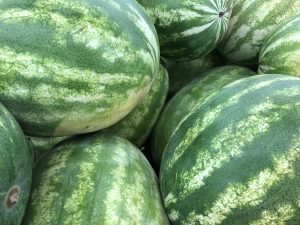
by jbreslawski | Jul 18, 2019

Photo source: UF/IFAS Northwest District
Have you noticed recently that there have been many sales on watermelon at your local grocery store and farmers’ markets and roadside stands have an abundant supply? That is because watermelon and July go together like peanut butter and jelly or bacon and eggs. This cool and refreshing fruit is now in season locally. Whether you like to spit seeds or prefer the seedless variety, this fruit is a healthy addition to your plate. Naturally low in sodium and calories, watermelon is an excellent source of vitamin A and can help keep you hydrated. It also is an excellent source of the antioxidant, lycopene (which gives the melon meat that pretty reddish-pink color). To select the best watermelon, look for one that is heavy for its size, has a uniform shape, and a dark, dull green color. A yellow spot on one side means that the fruit has been given time to ripen in the field and develop flavor.
Do not forget to give your watermelon a good rinse under cool water before slicing. Putting a knife through that melon can carry all of the bacteria from the rind and spread it onto the fruit. Since watermelon is not usually cooked, that means that bacteria will not be killed and you have a chance of getting a foodborne illness. Remember to do this with your cantaloupe and other melons too. Too much watermelon? Try serving watermelon in different ways like in a melon salad, or even in, or alongside, chicken salad. Watermelon should be refrigerated after being cut and can be frozen too. Use chunks of frozen watermelon in smoothies and other drinks too.
Here is a recipe for a bubbly, refreshing watermelon drink from Fresh From Florida to serve at your July picnic:
FLORIDA WATERMELON FIZZ
INGREDIENTS: 5 cups Florida watermelon (seeded and cubed); Florida honey, to taste; 2 cups sparkling water; one lemon, juiced; Fresh mint sprigs for garnish
PREPARATION: Add watermelon, honey, and lemon juice to a blender and process until smooth. Strain puree through a fine sieve or strainer. Fill four glasses with ice. Evenly distribute the strained juice into each glass. Top each glass with sparkling water and stir once. Garnish with fresh mint sprigs.
https://www.followfreshfromflorida.com/recipes/florida-watermelon-fizz/#
by jbreslawski | Feb 24, 2017
 Nationally, America Saves Week is an annual opportunity to promote good personal savings behavior!
Nationally, America Saves Week is an annual opportunity to promote good personal savings behavior!
More locally, the University of Florida Institute of Food and Agricultural Sciences (UF/IFAS) is collaborating with America Saves in a campaign to help Floridians build wealth, not debt! The Florida Saves, (floridasaves.org) statewide initiative has been officially endorsed by Jeff Atwater chief financial officer for the state of Florida. Why? Because research shows that, too many households with an unexpected expense of just $400 could be thrown into a financial crisis! This means a clog in the sink or a broken freezer could easily send a family into debt.
During Florida Saves Week, February 27 to March 4, 2017 UF/IFAS is urging residents to pledge to set a goal and start saving! Like our Florida Saves Facebook page to keep up with the latest info.
Saving money for an emergency makes good sense. Families with money saved for an emergency are less likely to face financial stress, less likely to fall behind on their bills, and less likely to deal with subprime alternative money sources that have higher costs than conventional options.
Make a commitment to yourself and take the Florida Saves pledge to help you reach your savings and debt reduction goals. Additionally, Florida Saves will motivate you with periodic information, advice, tips and reminders sent by email or text message to help you reach your savings goal. Paying yourself first, saving your tax refund, and saving automatically are just a few ways that Florida Saves encourages you to build wealth and reduce debt.
Plus, this year Floridians who pledge to become a saver can enter to win $50 to be put toward reaching their financial goals by completing a short survey after setting a goal and signing the Florida Saves pledge.
Want to win more? Take a video or photo to share your savings story and follow the link to enter to win a national prize of $1,000 in theAmerica Saves http://www.americasavesweek.org/imsavingfor/ contest.
Take the pledge at floridasaves.org Set a goal and make a plan!
by jbreslawski | Jun 11, 2016
 In Florida, we are so lucky to have access to beautiful beaches and weather. There are an infinite number of outdoor activities to do. This past week I tried a new one for me, SUP (Stand Up Paddle boarding). I fell a few times, but finally found my balance and had a blast all day long. Things changed though when the fun was over and I realized that I forgot to wear a hat and had a blistering burn on my scalp. According to the Center for disease control the sun can burn unprotected skin in as little as 15 minutes. In order to protect yourself from the sun be sure to apply and reapply sunscreen (at least SPF 15) regularly, stay in the shade, wear a hat and UV protective sunglasses, when possible protective clothing such as long sleeved shirts and pants, and limit time outdoors in peak sun hours of 10am-4pm.
In Florida, we are so lucky to have access to beautiful beaches and weather. There are an infinite number of outdoor activities to do. This past week I tried a new one for me, SUP (Stand Up Paddle boarding). I fell a few times, but finally found my balance and had a blast all day long. Things changed though when the fun was over and I realized that I forgot to wear a hat and had a blistering burn on my scalp. According to the Center for disease control the sun can burn unprotected skin in as little as 15 minutes. In order to protect yourself from the sun be sure to apply and reapply sunscreen (at least SPF 15) regularly, stay in the shade, wear a hat and UV protective sunglasses, when possible protective clothing such as long sleeved shirts and pants, and limit time outdoors in peak sun hours of 10am-4pm.
Oh, so you don’t need to because you tan? Well think again. esides leaving you with an awful burn, blisters and flakey skin, sitting out in the sun can cause lines and wrinkles, sun-spots, and increase your chance of skin cancer. The American Cancer Society is estimating 6,200 new cases of skin cancer, this year, in Florida alone. Most of these cases can be linked to too much sun exposure. Regular sun protection can reduce the risk of developing skin cancer; regular dermatologist skin checks and self-exams can help identify cases early. The Skin Cancer Foundation, recommends keeping watch for individual moles that are misshapen, have uneven borders, a variety of colors, a diameter of over ¼”, or have changed in any of these features. This summer have fun, live in the moment, try something new, but don’t forget your SPF.

by jbreslawski | Mar 11, 2016
 It seems that everywhere you look, an egg hunt is being advertised, egg dye kits are on every corner in the store, and the Internet is a-buzz with cool decorating ideas. Keep in mind this season that this fun family activity could turn rotten if you forget food safety.
It seems that everywhere you look, an egg hunt is being advertised, egg dye kits are on every corner in the store, and the Internet is a-buzz with cool decorating ideas. Keep in mind this season that this fun family activity could turn rotten if you forget food safety.
Outbreaks of foodborne illness, especially salmonella, have been associated with the improper preparation and storage of eggs. Salmonella is not something you want to remember when you think back to memories of decorating and hunting eggs in the spring.
Common symptoms of salmonella include nausea, vomiting, abdominal cramps, diarrhea, fever, and headache. Children are one population most susceptible to foodborne illness.
There is no reason to worry about potential food safety hazards associated with your holiday eggs as long as you remember to follow these guidelines:
- Clean and sanitize your hands, preparation area, and utensils before, during, and after the cooking process.
- Use eggs that are clean and free of cracks and leaks.
- Cook eggs completely – no rushing or short cuts. If you don’t have the time, pick another day to do it.
- Use only food-grade dyes; these include food coloring and dye sold in egg dye kits. Use beet juice, blueberry juice, etc. as alternatives to artificial dye.
- Refrigerate eggs as soon as you are finished decorating or, if decorating later, after cooking and drying.
- The refrigerator door is the warmest spot in your fridge; store eggs in the carton in the main compartment, not in the door.
- Toss eggs that have been out of the refrigerator for more than 2 hours. If eggs are not “found” or eaten, within this time, make the sacrifice and throw them away (of course, do this while the kids aren’t looking.)
- When hiding eggs for a hunt, keep them in areas that are clean, free of dirt, and away from pets or pests. Consider decorating one set for hunting and another for eating.
- Hard-boiled eggs are safe for up to one week with proper cooking, storing, and handling procedures.
Keep these guidelines in mind for an “egg”cellent holiday with family, friends, and fun!






